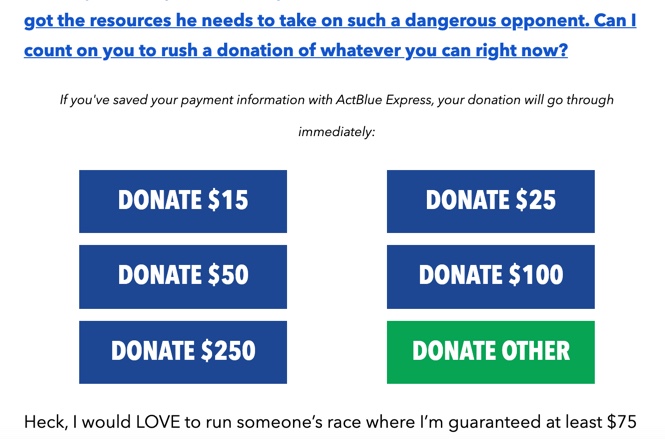It’s Not Just Seniors That Fall for Scams – The Young Are Fleeced Even More Often
Category: Financial and taxes in retirement
June 29, 2021 — We baby boomers are constantly being warned that scammers are ready to take our last nickel, if we let down our guard for just one careless moment. An interesting pair of articles in the New York Times showed how that can happen to seniors, and surprisingly, that people in their 20s are twice as likely to lose big bucks to the internet’s artful dodgers than older people. Online Trickery Traps Seniors reported on how the elderly (and that increasingly means us) fell prey to unethical political fundraising ploys from both parties in the recent elections. The second article, The Young Fall for Scams More Than Seniors, found that scams involving job offers, paper checks, and student loan forgiveness snagged a surprising percentage of people aged 20-29.
Political parties got rich on older people.
During the last election seniors were much more likely to fall prey to political fundraising chicanery than younger folks. The most common unethical ploy was to use pre-checked boxes hidden in the fine print. Leaving them checked would authorize continuing donations, often weekly. Many people found themselves over their credit limits and unable to pay for these multiple, unintended gifts to political campaigns. Questionable tactics, combined with aging brains less able to recognize deceit, registered a big payday for the campaigns at the expense of many older Americans. The Times article described a family that was horrified to discover that their not fully functional, 69 year old father had donated $25,000 via hundreds of donations to Republican causes.
Both political parties used questionable methods to raise money in the last election. Judging by the number of refunds given back, it appears that Republican fundraisers, including former President Trump, were 3 times more likely to have used these techniques than Democrats. Political operatives used strident claims and warnings sure to appeal to older Americans, like “Social Security” or “Final Warning”. The number of donations that were later refunded is being used as a measure of how many people were deceived by these fund raising efforts. In its study, the Times found that “more than four times as much money was refunded to donors who are 70 and older” than to people under 50. In one state, California, about $25 million was refunded to 65,000 donors from both parties.

Younger people are victims too.
Meanwhile people in their 20s have been falling to other types of internet scams. The Better Business Bureau estimates that over 80% of younger people exposed to internet scams fell for them. Many of those had to do with paper checks, a phenomenon unfamiliar to many younger people. A typical scam is to be sent a check which the recipient then deposits. The check temporarily clears, and then the sender sends an embarrassed note saying the check was mistakenly written for too much, and asks for a partial refund. By the time the young person’s gift card or other payment goes out to the scammer, the original check has bounced, leaving the victim holding the bag. Other techniques involve promises of jobs, student loan forgiveness, and great shopping deals — as long as the victim makea some kind of small payment first. Of course there are no jobs or deals at the end of those rainbows. Many of the deals use links that go to fake Amazon sites.
So what can you do?
The first thing anyone can do is to be wary of any email or online ad that asks for money. Even though the headline might warn about some catastrophe that you really care about, don’t respond directly to the ad. If you really want to make a contribution, go directly to the organization and make it there, or send them a check. Do not update your personal information after receiving any email or phone call notice. Do not use any links provided. The Social Security Administration or IRS will never call you, but spammers pretending to be the government will. Beware especially of pre-checked boxes hidden in small text. If they say things like you are authorizing continuing donations, uncheck them, or just write a check directly. The unscrupulous rely on you to not read everything carefully, or for older eyes to miss hidden land mines.
Regarding the susceptibility of younger people to fall for scams, the Times had some excellent advice for how you can help. Tell your children or grandchildren about how you might have had a near miss or even fallen for something in the past. Like the time your editor misdialed a credit card company and ended up giving too much information to the scammers that had arranged to get a telephone number very close to that of the legitimate company. Your personal experience will likely make an impression and improve their scam detection skills.
Bottom line. Have you fallen victim to any online schemes? Or do you have a plan for educating your younger (and older) relatives on the pitfalls of the internet world. Please share your thoughts in the Comments section below.






Comments on "It’s Not Just Seniors That Fall for Scams – The Young Are Fleeced Even More Often"
JD says:
Educate younger relatives? They don't need "education" they just need to follow one simple dictum: If it sounds too good to be true, it is. Or as Milton Friedman famously said: "There ain't no such thing as a free lunch." Plus, if someone is asking you for money and is promising you more money, it's a scam. It isn't that hard. Be a cynic.